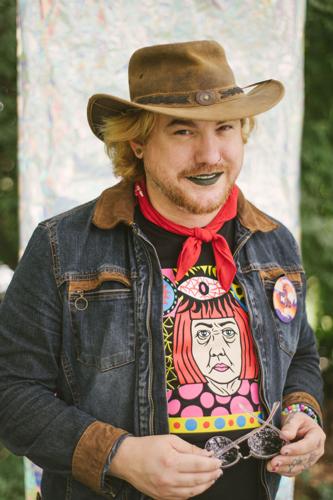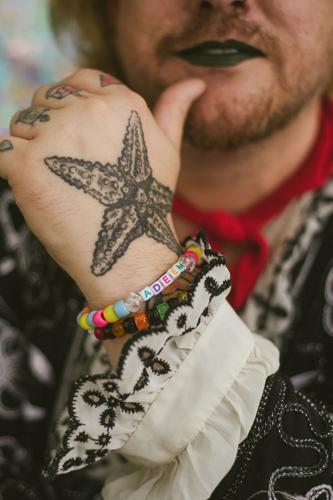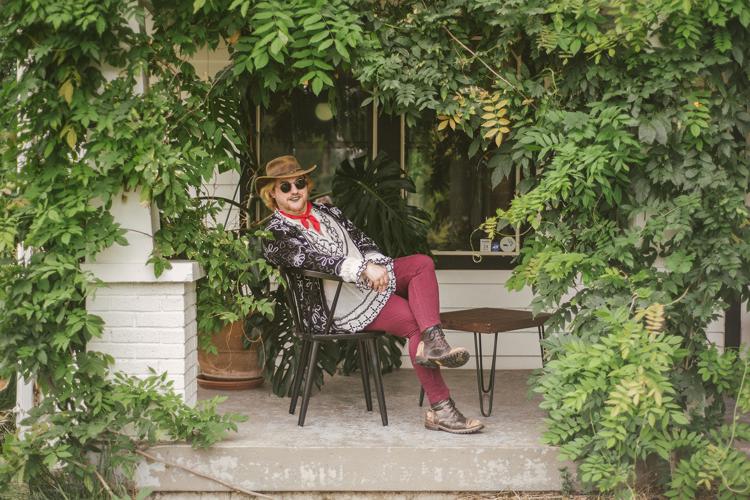
When I meet Adeem the Artist at Dose in Riverside Village, the critically acclaimed rising star is sipping an iced chai, their perfectly applied forest-green lipstick staying fixed in place. Based in East Tennessee, they’re only in Nashville for the afternoon, stopping by for a handful of meetings before hitting the road for other engagements. Despite the tight timeline, Adeem is eager to chat about, among other topics, their recent accomplishments, like performing on the Grand Ole Opry for the first time in June and nabbing a nomination for Emerging Act of the Year at the Americana Music Association’s annual Honors and Awards ceremony, set for Sept. 20 at the Ryman. They’ll also play Sept. 21 at The Vinyl Lounge.
Adeem is as thoughtful in conversation as they are in their music, holding forth on topics as wide-ranging as class solidarity and ’90s country music with passion and expertise. That’s no surprise to any listener of Adeem’s, of course, as the singer-songwriter’s brand of country music is clear-eyed, whip-smart and pulls no punches. That’s certainly true of their 2022 record White Trash Revelry, a fittingly celebrated collection of songs that offers a nuanced, grounded look at class, gender and intersectionality.
It’s also true of their recent one-off “Sundown Town,” a satire written in response to Jason Aldean’s “Try That in a Small Town,” a dog whistle of a song whose video — which CMT announced it had pulled from its programming — pairs footage of protests (some of which actually occurred in Canada) with lyrics like, “See how far ya make it down the road / Around here, we take care of our own.” “Sundown Town” is more clever by a country mile, with lines like, “I sweat a lot and I sing ’em loud / Even though I didn’t write the shit I’m singing about / I just read the words and say ‘That was good’ / As long as it implies a gown and hood.”
Unsurprisingly, Adeem received quite a bit of blowback from the parody, but not just from right-wingers. During an interview with critic Emily Nussbaum on The New Yorker Radio Hour podcast, Adeem expressed frustration with wealthy liberals who blame poor Southerners for their own poverty. They soon received hate mail from Democrats — “very fine people on both sides,” it seems.
Recently, the Scene caught up with Adeem about being recognized by the Americana community, the flattening of online discourse and, of course, writing and fielding reactions to “Sundown Town.”
How does it feel to be recognized as an Emerging Act nominee at the Americana Awards?
It was very surreal. I won tickets to the Americana Award ceremony in 2017 from a radio station out here that I followed on Twitter. So me and my partner went that year, having no context for what Americana was. We just knew that John Prine and Van Morrison were going to be there. We discovered Rhiannon Giddens that night. We discovered Hurray for the Riff Raff. At the time, I was starting to write country music and starting to study country music again, after having been gone for a while — because of, you know, bigotry. … Sitting in that space at the Ryman, listening to Jim Lauderdale lambaste [Trump], it felt very warm, like maybe this is my corner. Maybe this is where I could fit. I remember when I got home I wrote my friend and said, “That’s the stage I want to be on.”
Well, that’s about as full-circle as it gets, winning tickets to an award show you’d later wind up attending as an honoree. Given the state of country music and the much-argued-about “culture wars,” how do you see the Americana genre and its kind of catchall mentality, within this broader ecosystem?
As a genre, it’s a really expansive idea conceptually. To me, it feels really frustrating in a lot of ways. As a fan of D’Orjay the Singing Shaman, as a fan of Amythyst Kiah — they’ve been told for so long that they’re not country because of the color of their skin. And having that wrapped up in, “Oh no, you’re really soul,” or whatever dog whistle gets thrown around, there’s a frustration to it. The idea that protecting the monolithic view of country music and the tradition of country music as a sort of white, cis-male-dominated thing doesn’t feel good to me. I don’t know that it adds to the greater discourse to have this sort of subgenre. I make country music. My records are pretty explicitly that. But people correct me when I say that; they say, “Well, it’s more Americana.”

Adeem the Artist
Do you push back on that, or ask what they mean?
No. Because I don’t care at the end of the day. But I do think the protectiveness of that [country] space leads to a lot of real, tangible harm, whether that be from instances like this song [“Try That in a Small Town”] that so clearly harkens to the specter of sundown towns — or just the fact that there’s a handful of dudes who haven’t moved beyond ’80s pop-culture ideas of being gender normative, who are still asserting that that’s the way it is and that’s the way it has to be. There are a lot of kids who aren’t being exposed to the fullness of who they are or who they could be. … I feel like it’s worth expanding the conversation for those kids to not be left behind. Especially as somebody who was barefoot running around the trailer as a kid — I think about Toby Keith, Garth Brooks, Shania Twain. Country music as it exists right now is more conservative than it was.
I agree. I think back to Garth Brooks’ 1992 song “We Shall Be Free,” which talks about ending racism and loving who you love and all these “taboo” topics. I don’t think it could get released today, at least not on country radio.
It’s hard to imagine Luke Combs doing something like that, and he’s pretty benign.
It’s been interesting to follow the conversation around Combs’ “Fast Car” cover. Most importantly I hope Tracy Chapman is making bank, but my first reaction was that it was cool to see one of country’s biggest mainstream stars cover a song by a queer Black woman. That counts for something to me. But maybe my bar is too low because I’ve seen a lot of criticism of his decision to do that.
I think discourse has devolved to a point where that level of nuance is no longer welcome to the table. Because there was a lot of that with the Morgan Wallen situation, too — where there were so many components that made that a really interesting and socially rich conversation that just got totally neglected. … Everything is getting distilled to their systems of operation, in a really weird way. For example, I put out this satire [“Sundown Town”] that everyone called a parody. People come on my Twitter and say stuff like, “You cancel-culture people are all the same. You should have your account banned for this.”
Gonna go out on a limb and say there’s a bit of irony in those two sentences being paired together.

Then they’re responding to me saying, “Explain to me exactly why you think Jason Aldean’s music video should be taken down.” When did I ever say that? And it’s because everybody is treating everyone that they interact with as sort of a spokesperson for this whole system of operation that they disagree with. And so people aren’t actually responding to me. They’re responding to this Antifa Power Rangers machine that they think I’m connected to, right, and that I’m just smashing country music. I don’t think Jason Aldean’s music video should be taken down. I don’t care. Ultimately, CMT should do whatever they want to do with CMT. And it’s none of my business. I think it’s interesting that there’s never really prime attention given to queer artists or people of color on that channel, really.
It’s low-hanging fruit — “Well, we removed that video, so can we have our gold star now?” But there’s way more that needs to be done.
And it actually catapulted the song forward. That became the moment: CMT pulling the trigger just made everybody care about it more.
While we’re talking about “Sundown Town,” one of many things that struck me about the song is how quickly you were able to write it. It’s such a clever and well-constructed song that it’s surprising it didn’t take weeks to finish. What did writing that one look like?
My friend Jason can finish drywall in a room in like an hour, you know what I mean? [Laughs] But also, I don’t have a lot of opportunity for creative action lately. I have a partner; I’m married; we got a 5-year-old and I’m touring. When I’m at home, I’m trying to bring this old pop-up camper back to life. I’m spending a lot of time in the driveway sanding and cleaning. So I think that’s part of it, too, is there’s kind of a pent-up excess of creative energy that just needs to be worked out.
So you have all this creativity brewing just beneath the surface, and then the Jason Aldean thing happens.
Yeah, because it also just pisses me off. It makes me very upset. And this is the nuance that everyone says they want but don’t actually want. The truth is, I don’t believe the writers of that song intended to be racist. I don’t think they intended to disparage Black people, or to scare marginalized voices. I think they genuinely thought they were espousing good small-town values. And I think they thought that because they only know how white people feel about the words they use. They never thought about how it would sound to anybody from any divergent perspective. So to me, the conversation is way less about how Jason Aldean is racist and way more about how this genre is so devoid of perspective that people can say the most asinine, racist shit and it’s treated as normal. Because no one’s there to say, for example, there was a situation in 2020 where a Black man [Ahmaud Arbery] was jogging through a small town and that didn’t go so well for him.
The New Yorker posted a conversation you had with Emily Nussbaum, who wrote a piece about the growing divide in country music for the magazine earlier this summer. What did you make of the piece and the podcast conversation?
I tell you what, I spent the last couple of days getting shit emails from Democrats. So it goes both ways. They were mad that I accused liberals of calling Southerners “toothless hicks.” And they told me that we should vote for better politicians. They basically proved my point. I would rather hang out with a Trump-supporting laborer than a wealthy Democrat. Class solidarity is my shit. … There is something about being from low class, being from laborers, [experiencing] generational poverty. I can communicate with people like that even if we disagree. We find ways around it. But liberal Democrats? I said that I was mad that liberals called us “toothless hicks,” and Democrats wrote to tell me that I was a conservative propaganda machine. I was like, “Motherfucker.” Anyway, cognitive dissonance is available to all who seek it.
Ahead of AmericanaFest, check out our conversations with Adeem the Artist and SistaStrings, our show recommendations and more








